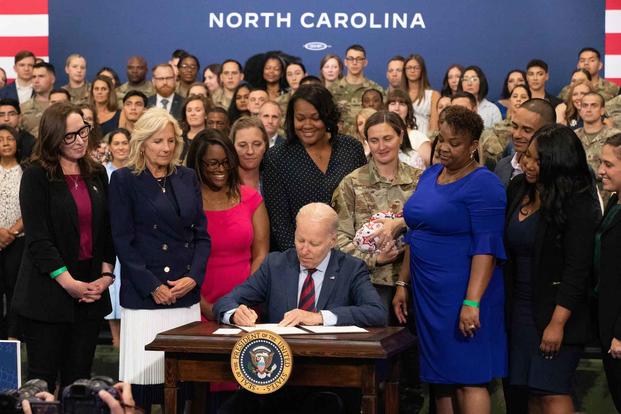Military spouses could have more opportunities to work remotely for the federal government under legislation advancing through Congress, giving spouses more options for stable employment as they move from duty station to duty station with their partners in uniform.
An amendment added to the House's version of the National Defense Authorization Act last week would specify that federal agencies can hire military spouses to work remotely using an expedited hiring process reserved for those spouses. The same measure was approved by the Senate as a standalone bill in a voice vote last week.
While some opportunities already exist for military spouses to do telework for the government and President Joe Biden recently signed an executive aimed at expanding those opportunities, military spouses say legislation is needed to fix the long-standing issue of high unemployment among their community.
Read Next: Gender Neutral Standards, Return to Old Fitness Test: Congress' Dueling Ideas for the Army
"These spouses are qualified, they're willing to work, they're kind of captive," said Maria Donnelly, an Army spouse who no longer works for the government because of difficulty transferring when her husband changed stations. "And at least speaking for myself, not working as a result of military orders, that had a huge impact on my marriage and my mental health. It was a recurring conversation for us of whether or not my husband would stay in. And we talk all about retaining the family, but we're not doing it."
The unemployment rate for military spouses has remained stubbornly high despite years of efforts by the federal government to incentivize employers. Since about 2015, the military spouse unemployment rate has hovered at about 21%, according to Defense Department data. By comparison, the national unemployment rate in May was about 3.7%, according to the Bureau of Labor Statistics' most recent data.
Earlier this month, Biden signed an executive order aimed in part at ensuring the 16,000 military spouses employed by the federal government can keep their jobs if they have to move. Specifically, the order directed the Office of Personnel Management to review its remote and telework policies, and federal agencies to develop consistent standards for a program that allows civilian government employees to work remotely overseas.
But military spouses said legislation is still needed because it's more lasting than an executive order. Further, they said, a law will prevent top officials from skirting policies allowing remote work or force agencies to rethink restrictive policies, such as ones that require remote workers to live within two hours of their office.
"For so many people who request remote work flexibility or leave without pay or the ability to transfer within an organization, they get responses that are basically, 'We'd love to help you out, but there's no policy," said Emmalee Gruesen, a Navy spouse.
While Gruesen has been able to work remotely for the government, she said she believes a law would clarify policies and make it easier for other spouses to find work.
"Often, the immediate supervisor or second-line supervisor is supportive, but there's a breakdown between your immediate supervisor, middle management and agency leadership," she said. "Post-COVID, I think we really learned many positions that we didn't see as being remote work eligible were successfully executed during the pandemic."
The proposal added to the House's National Defense Authorization Act, or NDAA, and separately approved by the Senate would amend the law on hiring military spouses at government agencies without a competitive process by specifying that remote or telework is allowed. It would also call on the Government Accountability Office to study the issue of remote government work.
The House measure was championed by Rep. Jasmine Crockett, D-Texas, and House Armed Services Committee member Rep. Chrissy Houlahan, D-Pa., and the Senate bill was sponsored by Sen. James Lankford, R-Okla.
The NDAA, which is considered a must-pass bill and is the main legislative vehicle for policies relating to the military, still has several steps before it will become law. However, bipartisan support in both chambers of Congress for the spouse employment proposal increases the chances it will be in the final bill.
"I'm hopeful that allowing for these remote options and directing agencies, rather than recommending or asking the way that the [executive order] does, will actually start to make a dent," Donnelly said. "It's low-hanging fruit. It's free to do. It costs the U.S. government no money to retain spouses. It actually saves them money long term. And it actually has the chance to fix something."
-- Rebecca Kheel can be reached at rebecca.kheel@military.com. Follow her on Twitter @reporterkheel.
Related: Top Corporations Still Slow to Fix Military Spouse Unemployment












